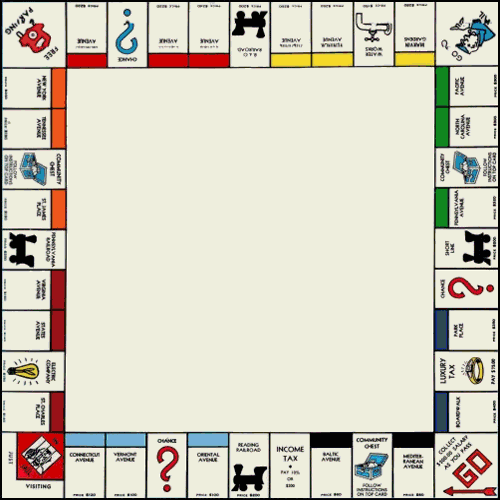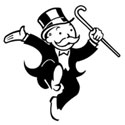The Monopoly game shows us that for over a century, the economic system behind land ownership has remained more or less the same in the western world. Each time we lose a monopoly game we realize how difficult it is to become an important player when you have only few properties in town, except when you´re extremely lucky on the dice. Each time we win, we understand how it really works well to be a monopolist – of any kind in any place, be it in real estate, the fast food industry, nightlife, in New York, São Paulo or Manchester. Money you invest in land will bring you more money, while those who rent pay the bill. During economic crises however, these rules are turned upside-down.

Monopoly was based on the Landlord´s Game, a board game made in 1904 by Elizabeth Magie. She built the game according to the principles of Henry George, who stated that in essence all wealth comes from land ownership and that this should therefore be the main source of tax revenues in a fair society. Magie used the game to demonstrate how rents enrich property owners and impoverish tenants. The consciousness of this ongoing injustice would eventually encourage citizens to change the economic system, she thought. In the following hundred years, the Monopoly game has dominated the world, apparently without provoking such effects. In 1935 she sells the game patent to the Parker brothers. Shortly after the financial crisis of 1929, the emblematic game became an instant commercial success. Similar games were developed at the same time, such as Finance, in 1932.

The well-known game board of New York still featured places like the Boardwalk, which would become abandoned realty failures only a few decades later. Newer game boards feature boom-towns like Hollywood and Las Vegas. Shortly after the oil crisis in the seventies, an Anti-Monopoly game was brought out by professor Ralph Anspach (San Fransisco University). In this game, the initial situation was in fact a monopoly, whereas the players had to try and return to a free market situation during the game. Numerous other -opoly games were made throughout the years, including Ghettopoly, a version dealing with Harlem and other delicate neighborhoods, which was considered shocking and racist. Recently, a Monopoly Recession Edition was launched, describing the collapsed real estate market of 2009, marked by foreclosures and bankruptcies. Fast Food Franchise is about becoming a snack food tycoon, while Rua Augusta monopolizes bars and night clubs in a popular leisure area of São Paulo. After urban space, the game format has recently been used to play competition and domination in cyberspace, for example in Googolopoly and Blogpoly.
I,personally,am a huge Monopoly lover.This is a great product.